Grant Langston: Unplugged
How good is Grant Langston! Okay, not everyone’s a fan of that cloying South African accent, but the insights that this former AMA MX and SX champ routinely offers while commentating the AMA Pro MX Championship on Fox Sports are mind-bogglingly on-point. Just as he did back in his racing days, Langston calls it how he sees it on TV. Unapologetically! Alongside fellow series announcer and anchor, Jason Weigandt, the candour and often-brutal honesty with which Langston delivers information is refreshingly real in the button-down world of motorsport diplomacy.
None of Langston’s television persona is contrived, though. It’s a product of many tough years as a professional motocross rider and some very challenging years that followed that career; years that were defined by demons and darkness, and by the drugs he took to numb the pain.
Every weekend that we watch and listen to Langston’s riveting commentary on Fox Sports, we’re reminded of his incredible back-story. We’re reminded of his triumph over cancer and a self-destructive mindset that could have cost him his life. And we’re reminded of his frankness in a Transmoto magazine article published back in 2014, when Langston spoke about his dark years and the journey back to a fulfilling life.
Here’s the content of that memorable Grant Langston profile, originally published in Transmoto’s print magazine in November-December, 2014 (Issue #47).
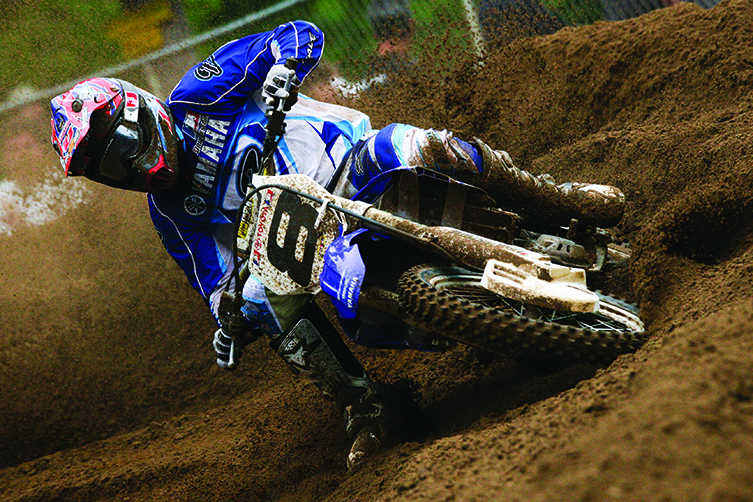
The Contented Battler
After winning World and AMA MX titles, a sudden cancer diagnosis precipitated Grant Langston’s downhill spiral – physically and mentally. Now that “GL” is healthy and back in the spotlight as a television commentator, Transmoto’s Eric Johnson spoke to the popular South African about his journey into darkness, and the fight back out of it.
As the summer of 2007 began its final act and moved into October, Grant Langston clinched the 450MX National Championship in a thrilling late-season surge. It saw him run down and defeat title combatants Kevin Windham, Andrew Short, Tim Ferry and Mike Alessi, and the popular South African became, arguably, the best motocross racer in the world.
Once the dust settled and Langston rode off into the San Bernardino big bad sunlight, it was straight off to Las Vegas and the MGM Grand Garden Arena for the US Open of Supercross. Enjoying the finest form of his career, GL wanted to show the world he was just as deft in the art of supercross.
It was a discipline of the sport he had yet to crack the code on, but it all came right for Langston over the two nights of racing in Vegas and he straight-up defeated Chad Reed to score the Overall victory.
With a newly extended contract with Yamaha, 2008 shone brightly for Langston. The world was his and he was on top of it. And there he very well could have remained for a very long time if not for an issue involving his left eye – an issue which precipitated a slow, downward slide that could have taken everything from him, if not for his fighting spirit and an absolute passion for motocross.
This is the story of Grant Langston’s journey into darkness, and more importantly, his fight back out of it.
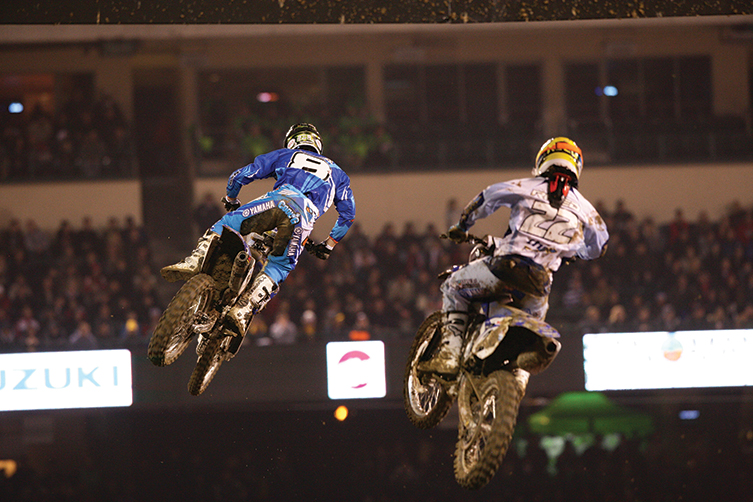 Above: In 2007, the popular South African wrapped up the premier-class AMA MX title and then won the US Open of SX. But his world was about to come tumbling down.
Above: In 2007, the popular South African wrapped up the premier-class AMA MX title and then won the US Open of SX. But his world was about to come tumbling down.
ON TOP OF THE WORLD
“Everything was going great,” reflected Grant Langston on a sunny and warm June afternoon in Corona, California. “2007 just came on fire at the end of the season for me. I was sixth in points at the halfway point of the 450 National Championship series, and I came all the way back to where I was in it at the very end. James Stewart got hurt and some of the other guys started stumbling and I just poured the pressure on at the end and, truthfully, I think I made a lot of those guys make mistakes. I ended up winning the final national at Glen Helen and won the title. I was just on top of the world.
“From there, I went straight to the US Open, where I wanted to battle James Stewart and Chad Reed because I felt like I was riding the best I had ever ridden, and they were the two guys to beat.
“I went on to win the US Open, so the race momentum was really on my side. My deal with Yamaha was then extended another year and all of a sudden, I’m sitting at home one day and thinking, ‘Life’s great; I’ve won the Outdoor title, I’ve won the US Open, I’ve gotten another extension on my contract with a pay increase, I’m a father and a husband and we’re financially stable. This is an awesome feeling. Now it’s all about racing. Now it’s all about trying to win.’”
Langston’s charge at supercross destiny began at Angel Stadium in the January of 2008, but, unlike his brilliant run of 2007, his racing ventures that winter, right from the onset, appeared to be star-crossed.
“I went from, ‘When can I be out there racing again?’ to the doctors saying, ‘Hang on, we’re talking life or death here.’ That really took the wind out of my sails.”
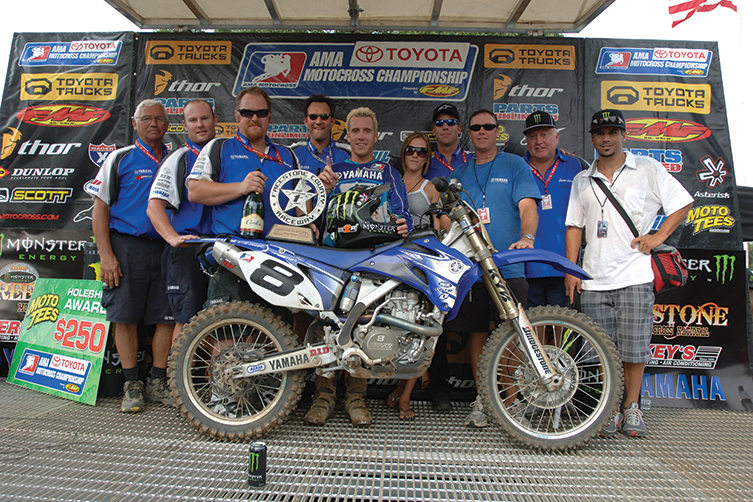
THE DOWNHILL SLIDE
“Coming into 2008, I felt like I could run with those guys and I really felt like if there was ever a chance to win in supercross, then ’08 would be it,” said Langston. “Shortly after the season started, everything was bad luck. At Anaheim 1, I made some mistakes and that was my fault. At Phoenix, my rear shock collapsed. It was a one-in-a-million deal, but it forced Kayaba to change their suspension. Then I went to Anaheim 2 and had a rear tyre rip apart and come off the rim.”
Things went from bad to worse when, shortly thereafter, Langston noticed that he was having trouble with his vision. “I went to the next race in San Francisco and all of a sudden I couldn’t see. I was thinking maybe I had mud in my eye. And then things started getting worse. So the season had barely gotten going and I felt like nothing was going right. Then going into Anaheim 3, I basically had to pull out. I said to Yamaha’s Keith McCarty, ‘I don’t know, Keith, I can barely see out of my eye’. Keith, who is a bit of a father figure to me said, ‘I’m not going to tell you to go race; I’m going to tell you you’re not racing.’ That was kind of the start of, for me, a frustrating downhill slide – professionally and personally.”
SEEKING HELP
Putting racing off to the side – in other words, putting his professional life on hold – Langston put all of his effort into sorting out his very troubling vision challenges: “I was trying to get answers. I got misdiagnosed. I travelled around the country. I even travelled around the world because I had something so unique. I even had surgery at the UCLA Eye Care Center, one of the best places in the world. I thought things were going to get better, only to find things got worse.
“It was really frustrating waking up and nothing seemed positive,” he continued. “I couldn’t race and that was my life. Eventually, I had a couple of the top eye institutions in the world say, ‘It’s melanoma. It’s cancer. It’s growing. Melanoma is an aggressive cancer and we need to sort this out now. Don’t worry about your racing career. You need to worry about your well-being and your life.’ All of a sudden, that hits you hard … like whoa! It was like I went from ‘When can I be out there racing again?’ to the doctors saying, ‘Hang on, we’re talking life or death.’ That was a big moment and it really took the wind out of my sails. I knew it was a big issue. It was bigger than coming back from a broken wrist or a torn knee. It was a whole different deal.”
“I always thought, ‘I’m a champion; I can bounce back from adversity; this is not me; I need to get my life together.’ It wasn’t that easy. I was trying to drive the demons from my head.”
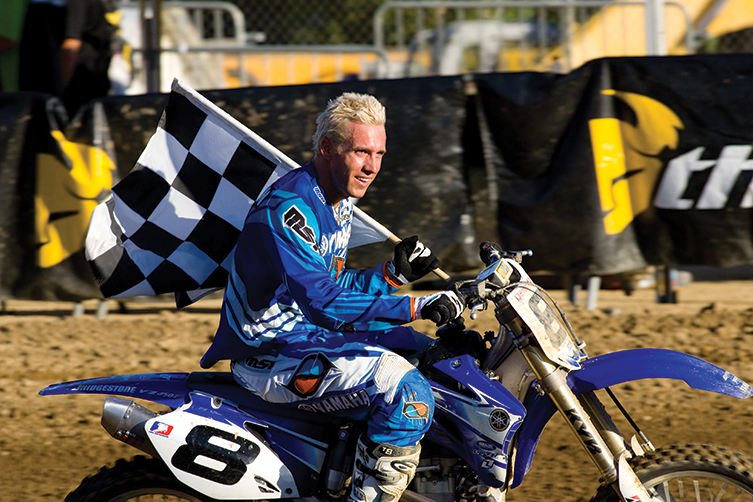
COLLATERAL DAMAGE
Langston’s vision problems became a matter of concern within the motocross community. Furthermore, now forced into a position where he had to stand down from the team and see how it all played out, GL soon found himself dealing with other matters in both his professional and personal life.
“There were so many other things involved,” he sighed. “The economy had tanked, our dealership business was struggling, all my real estate went to nothing, I had zero income and I was just watching my bank account disappear fast because I had people on the payroll. Also, there was family and people close to me involved in what I was dealing with, so I just couldn’t pull the plug on them. It was frustrating. When a lot of people look at you and say, ‘What are we going to do now?’, you feel bad. But worse, there were times when people didn’t come to me and say, ‘How are you doing?’ Are you okay?’ It just felt like a bit of a lonely place for a while.”
The aggressive treatment the doctors had performed on Langston proved to be successful, just as his competitive spirit was beginning to get the best of him: “The minute I thought I could race, and I tried to convince myself that the eye was good enough, I wanted to go racing. I wanted to come back to racing so bad because it didn’t end on my terms.”
FROM ‘COMEBACK’ TO DARKNESS
That May, Langston, aided by Team Yamaha, began preparing for his comeback: “I was planning on racing in 2009 and was trying to get ready for the Outdoors, and I ended up getting a flat front tyre at Glen Helen while practicing. I had a violent crash where the front washed quickly and I smashed my knee very hard. I felt it go. I knew it was really hurt. I went back to the truck and everybody – the guys from Yamaha, my trainer and mechanic – said, ‘Dude, you’re starting to look like the old GL.’ I said, ‘I’m done. I know I just did something bad. I felt it.’
Yet again, and despite his best efforts, Langston was forced off his bike and onto the couch. And that’s when the darkness began to encroach upon him.
“I basically tore everything in my knee. When I had my knee reconstructed and I was sitting at home, I was in a lot of physical pain. I was also in a lot of emotional pain because I knew it was another year of nothing. I hated that feeling. I absolutely hated it. I couldn’t even get off the coach. I was in agony for a couple of weeks. It was the most painful surgery I had ever had and I was having all these withdrawals, physically and mentally. I think I was self-medicating myself. The only thing that made me get out of bed was my kids. I think I might have been in an absolute state of depression.
“Everybody thinks I’m always happy and easygoing, but everybody has issues at some point. I think I wasn’t good enough about being honest and just saying what I was dealing with or going through. I was trying to hide it. Once people realised I had some issues, I had people close to me try to get involved and help me. That was a blessing. You know how it goes, Eric. If you don’t have people who can help you through some dark times, it can be a downward spiral and you never know where that’s going to end. I always thought, ‘I’m a champion and I can bounce back from adversity. This is not me. I need to get my life together.’ It wasn’t that easy. I was trying to drive the demons from my head, really.”
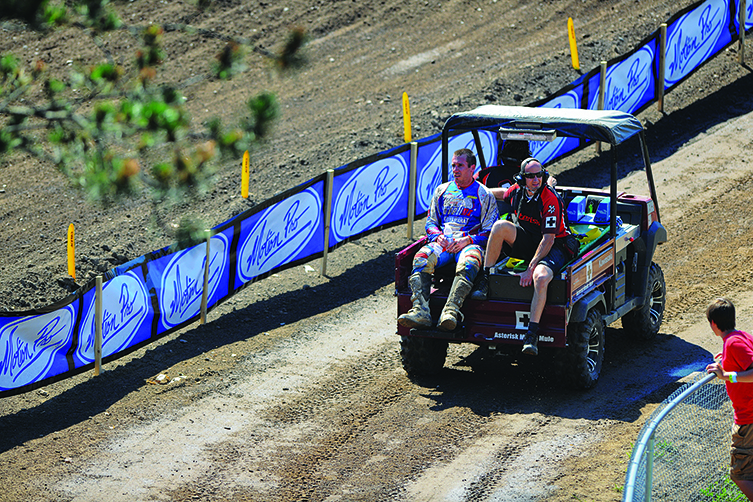 Above: After successful eye surgery, Langston’s comebacks were hampered by more injury. And in 2010, he called it quits after one last big crash at RedBud.
Above: After successful eye surgery, Langston’s comebacks were hampered by more injury. And in 2010, he called it quits after one last big crash at RedBud.
Despite the rough and tumble times he was trying to wade his way through, Langston refused to give up hope on making a return to racing. And to that end, he worked the phone, traded in some favours and ultimately strung together a low-key effort that placed him in the field for the 2010 RedBud National.
“I had one last big crash at RedBud,” said Langston of that fateful afternoon of July 3. “I woke up in the hospital and didn’t know where I was, and my arm was a big as a grapefruit. I just said, ‘I can’t do this anymore. I’m not having fun. I’m frustrated. I’m miserable.’ At that point I decided to kick it in the head and said, ‘You know what? I’m done.’”
His self-identity now gone and seemingly a man without a sport, Langston, in an effort to find some sort of relief, slipped into a deep blue underworld of alcohol and pain medication.
“I started drinking heavily again and relapsed on pain pills. It just numbed me. It numbed me from the truth. It’s like you’re there as a zombie. It took some of my frustration and inner pain and it numbed them. In my bad times, I remember waking up and having a double vodka energy drink and popping two pills. That was my breakfast.” That period left GL’s family divided and put his marriage to an end.
“Now everything I do revolves around racing. We train racers at the gym, we sell to racers at the shop and I talk about racers on TV. Life is good.”
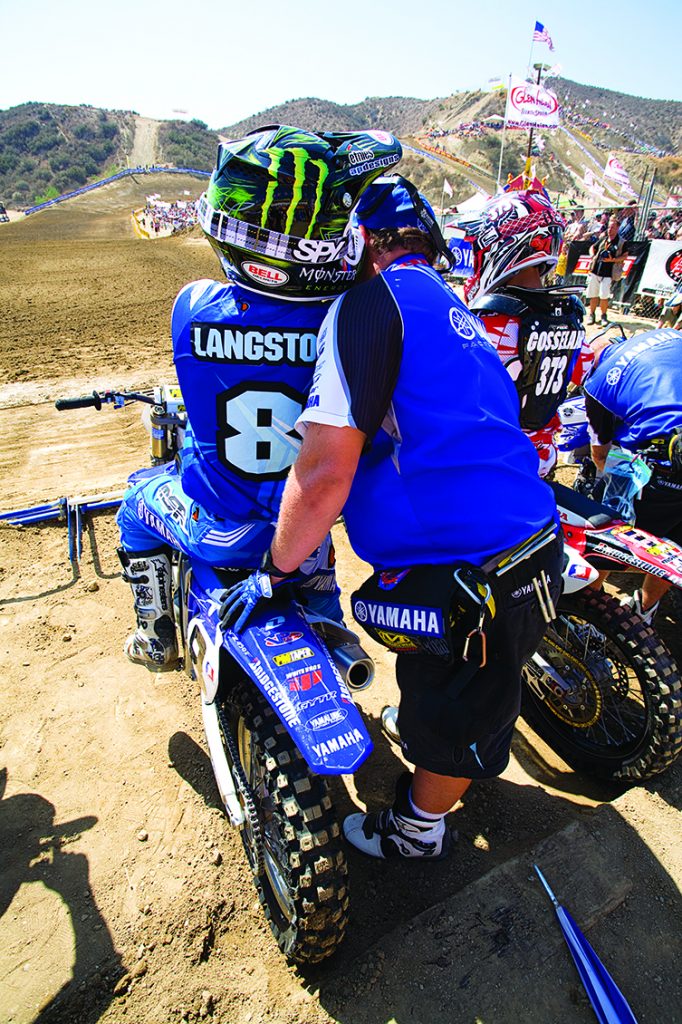
FIGHTING SPIRIT
“I kept telling myself, ‘I’m better than this. I’m better than this. Snap out of it. Get out of the house.” Finally, at the end of 2011, Langston knew he had to make a turn for the better: “I really started feeling that need to get up and get going. I didn’t really know what to do. I had some offers to train some kids and to get involved with the Rockwell Training Facility with John Louch. So a few little things like that started happening, which got me out of the house.”
In 2012, Grant Langston signed on to be the manager of the Team Ohlins USA Supercross outfit. And while it wasn’t precisely what he was looking for in his quest for a life after racing, it was certainly a step in the right direction.
“In 2012, the opportunity came up to be a team manager and a partner in a race team,” he reflects. “I’m glad I did it for the experience, but I realised that it didn’t make me happy. It’s stressful, you have to babysit a lot of people; it’s a 24/7, 365 job.”
Furthermore, Langston Motorsports – the multi-line motorcycle dealership Grant and his father Gerald has set-up in Perris, California – was rapidly gaining critical mass.
“I found my place there,” smiled Langston of the shop. “I’m really involved with everything regarding the business and when you see the progression, it’s really fulfilling.”
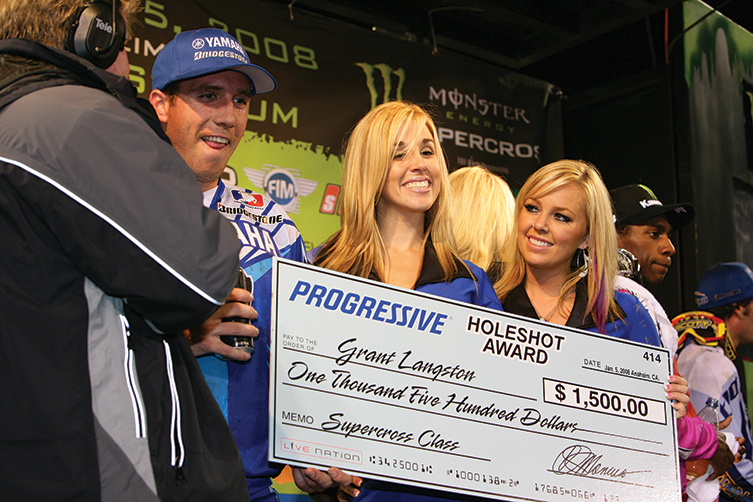 Above: On the podium with James Stewart and Chad Reed in 2007, Langston laps up the limelight. These days, he’s on the other side of the camera, and absolutely loves his commentary role with the AMA MX Championship.
Above: On the podium with James Stewart and Chad Reed in 2007, Langston laps up the limelight. These days, he’s on the other side of the camera, and absolutely loves his commentary role with the AMA MX Championship.
DISCOVERING TV
However, and as Langston enthusiastically spoke about, it was television that truly provided him with a new career, and one in which he could put the same amount of effort, determination and passion into as he did with his racing.
“After trying to run the team, I really wanted to try and let people know that I wanted to be on TV. I really pursued it. I do believe that I have a tonne of knowledge and I can relate a lot of things to a lot of people. I did feel like there were some good things that I could bring to the table. I knew I would enjoy being able to relay my story, through my eyes, to the viewers at home.”
And that’s where a motocross fan could find Grant Langston every Saturday during the 2014 Lucas Oil Pro Motocross Championship.“I was watching a re-run of Glen Helen and I caught myself yelling at a lapper to move over. Right then, I realised that I was still in the battle myself. I had my head in the game. I find my adrenaline going up on TV because I still feel it and I enjoy it. I get fulfilment out of articulating what’s going on with the racing. I like to help the fans understand what’s going on. Every time I watch a broadcast, I’m still fairly critical of myself. However, I know that’s going to fuel me to correct some mistakes and get better at what I do. I like to be involved in racing. Now everything I do revolves around racing. We train racers at the gym, we sell to racers at the shop and I talk about racers on TV. Life is good.”
FROM A MATE & COLLEAGUE
The most telling insights about people invariably come from those who’ve been close friends or worked with them. Which is exactly why we gave long-time buddy, Chad Reed, and fellow NBC commentator, Jason Weigandt, the opportunity to shed some light on the Grant Langston they’ve come to know. And love!

Chad Reed
The first time I met Grant Langston was at the Motocross des Nations in 2000. We were in St Jean d’ Angely, France, and although we were in different classes, everyone gets a chance to race each other for this event. I was on a Rinaldi-built YZ426F in the MX3 class and GL was on a KTM 125, fresh off his World MX2 title.
I remember battling him the entire moto. Being on the big heavy four-stroke, I was able to out-power him up the hills, but he would re-pass me on the downhills. It was back and forth like this every lap, each bike displaying its abilities on different sections of the circuit.
It was a great race and, not knowing him at all, it was a great introduction to a guy who would later become one of my closest friends.
“A year later, I would move to America and, by happenstance, very close to Langston. Because we were both young, away from home and sharing the same lifestyle, we hit it off immediately.
We rode together a lot and spent time together away from the track. There was a really good supercross track at Lake Elsinore and since we both had our own separate manufacturer test tracks, it was somewhere we could go and both ride together. GL was always laughing and causing a scene with his outgoing personality. Everyone who knows Grant seems to like him. He’s just that kind of guy. As years passed, we raced each other hard. And we’ve remained good friends to this day. There is no one quite like Grant Langston.”
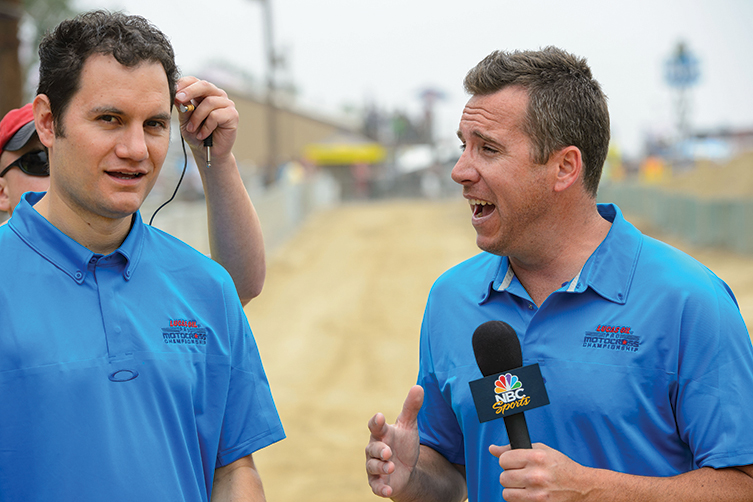
Jason Weigandt
You can’t take the GL out of GL. That’s what I’ve noticed after spending the summer alongside Grant Langston announcing the Lucas Oil Pro Motocross Championship. The guy had a rollercoaster racing career, and I’m now seeing that’s just a sample of everyday life for him. He dives headfirst into any opportunity that comes his way. Sometimes it turns out great, sometimes it turns out less-than-so. But he’s always having fun, always being himself, and when the pressure is really on in a must-perform situation, he always comes through.
“Cruising through the pits with Grant is like being on parade. He’s friends with everyone, and everyone is friends with him. You could be a random fan on the fence or a fellow racer who once banged bars with Grant or Grant’s dad, or maybe some obscure friend of a friend’s uncle. No worries, he’ll bench race with them all. As he says, ‘Always up for a good time and for a long time’.
“Grant dives headfirst into any opportunity that comes his way. Sometimes it turns out great, sometimes it turns out less-than-so. Grant doesn’t hide from his mistakes. GL is just always going to be GL – no apologies, no exceptions.” – Jason Weigandt
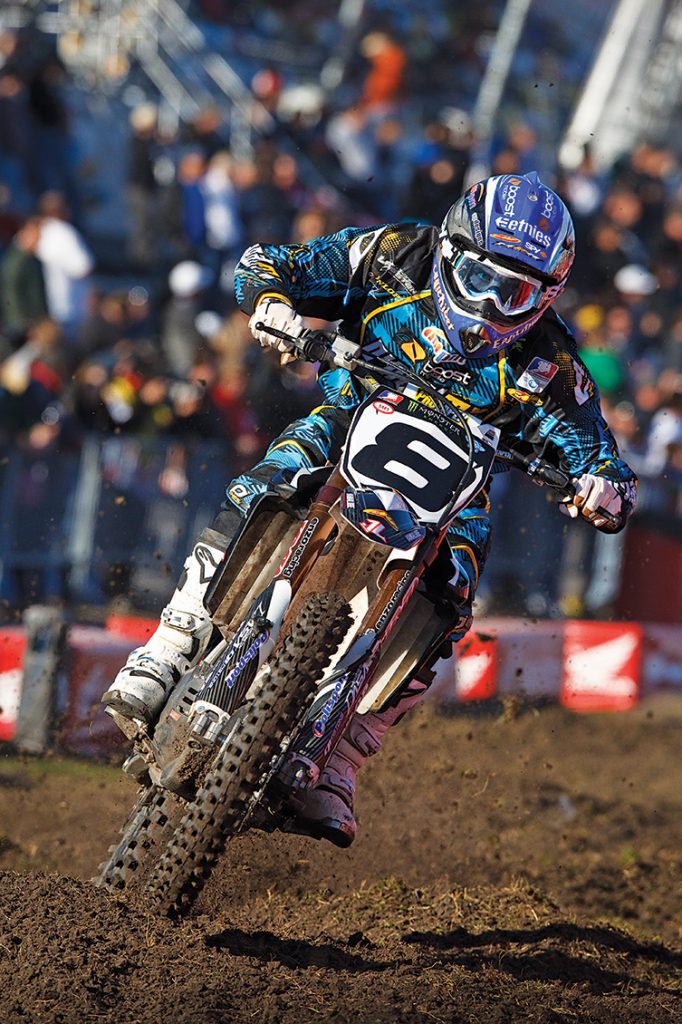
“I’d be lying if I said there weren’t a few nervous moments this year when he was late for a meeting, or pushing the envelope getting ready for a show. At Indiana, we had literally one minute to run out of the truck to do a live on-camera shot, but then Grant forgot we had to do it and he sat in the trailer while I started running.
I circled back to get him, we sprinted out, he nailed the live take, and then apologised to everyone on the crew, even though I was the only person who even knew about his gaffe. Grant doesn’t hide from his mistakes.
“Maybe he doesn’t need to memorise every minute from every meeting, anyway. He speaks from the heart and says what he knows. No one needs to teach him that.
“Funniest part is, anyone who worked with him as a racer shares similar stories. He’d be up in the KTM truck drinking a Red Bull before a moto with Ryan Hughes, seemingly not prepared at all, only to come out swinging when the gate dropped. One of his old mechanics told me Grant once rolled up late for practice and barely had time to get a lap in; but that one lap was an incredible lap. Just look at his various championship runs: always down to the wire, always harder than they could have been, but always successful. GL is just always going to be GL – no apologies, no exceptions.”
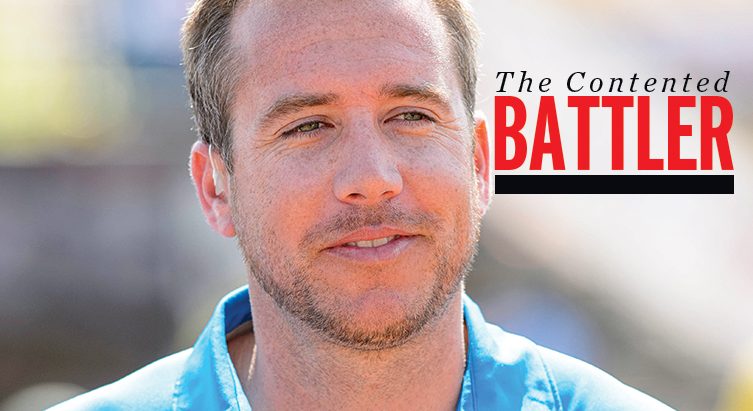
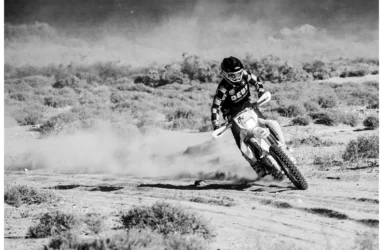
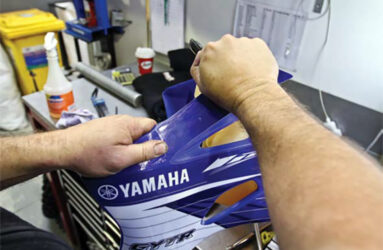
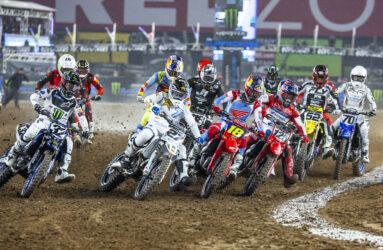
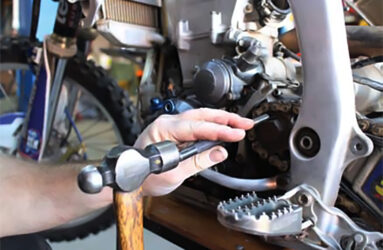

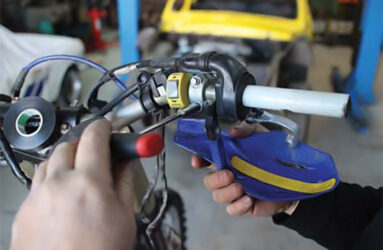

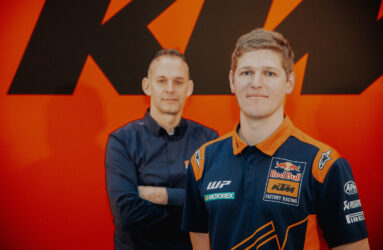
Be the first to comment...